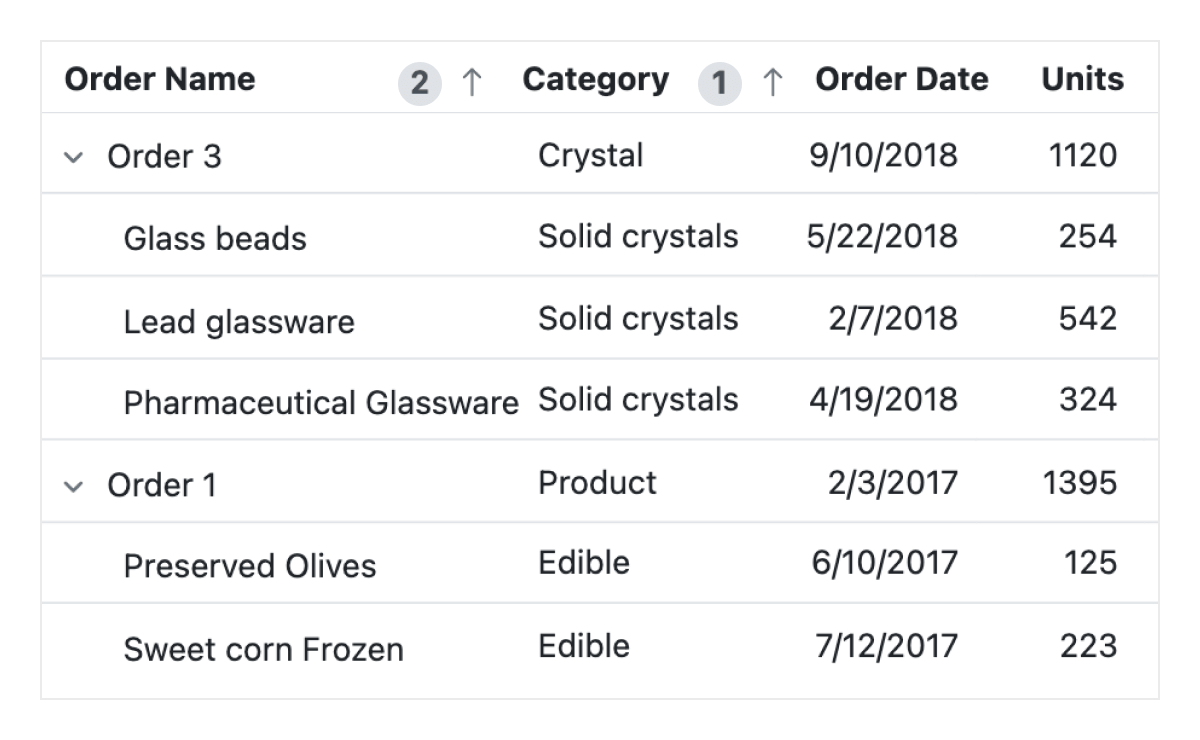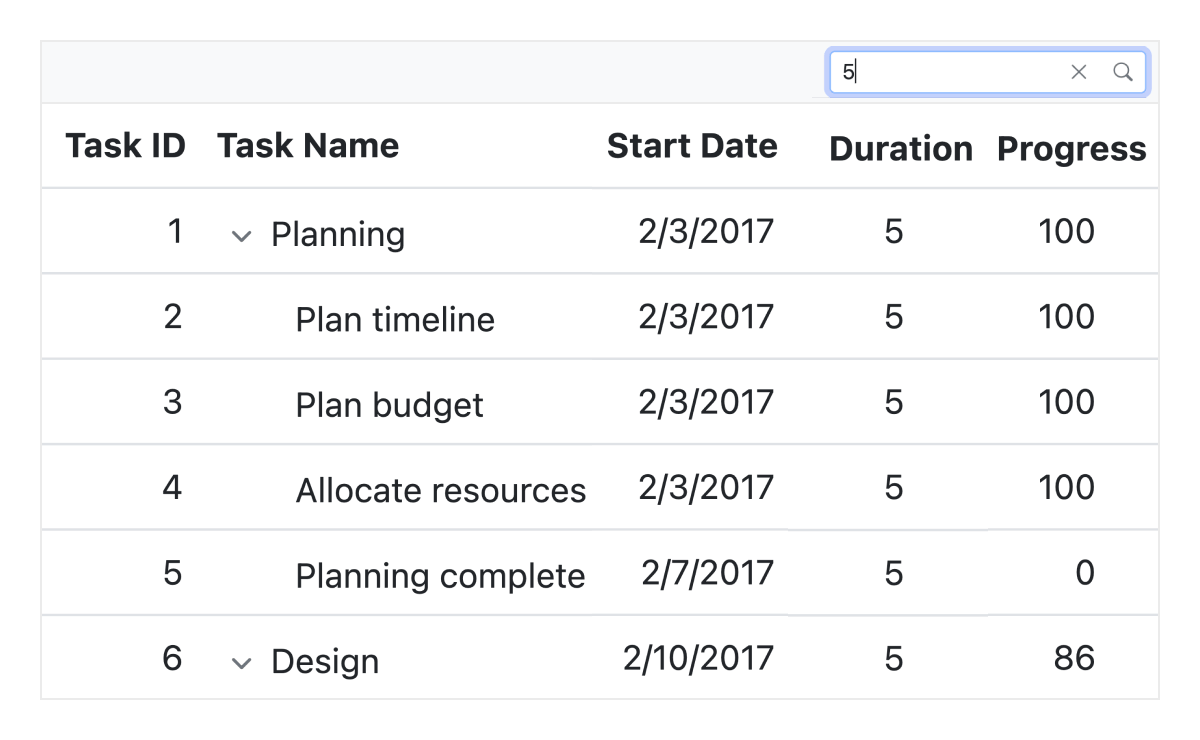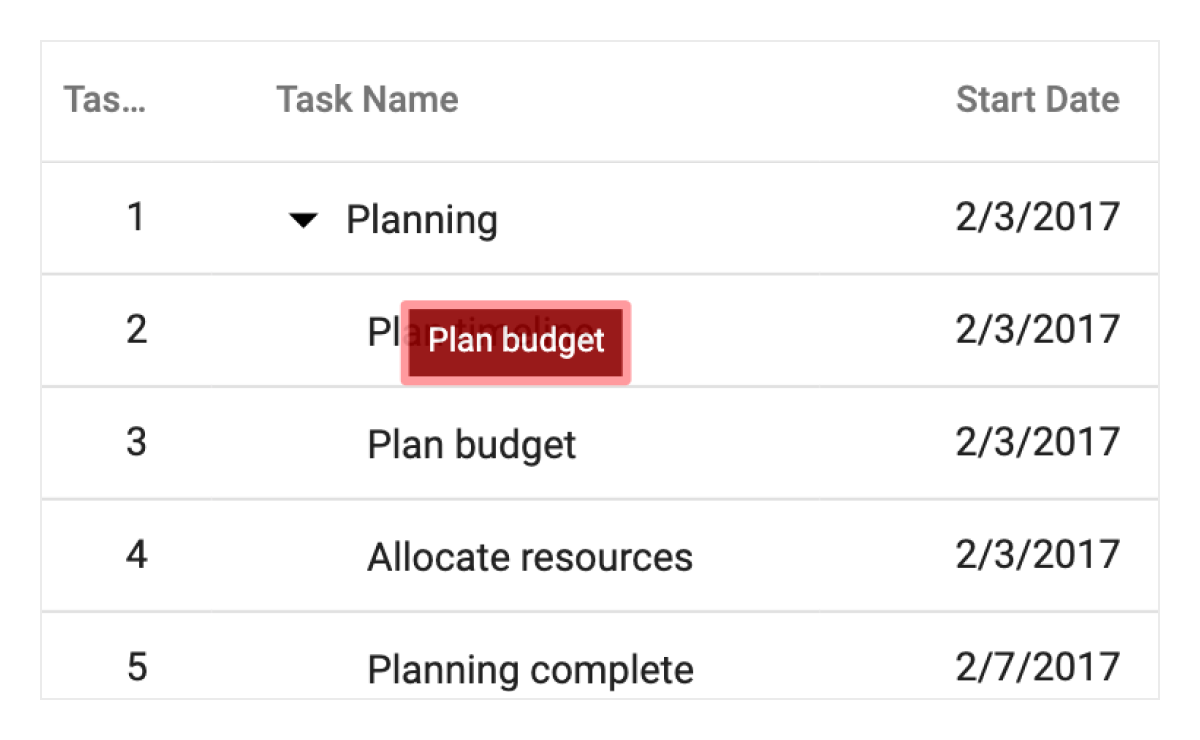
The React TreeGrid is a feature-rich control used to visualize self-referential, hierarchical data effectively in a tabular format (a tree-like structure). Its rich feature set includes many functionalities: data binding, virtualization, editing, sorting, searching, filtering, infinite scrolling, paging, frozen rows and columns, exporting to multiple formats, aggregating rows, and more.
Display data hierarchically, its optimized design provides high performance and load millions of records in just a few seconds.
Bind data seamlessly with various local and remote data sources such as JSON, OData, WCF, and RESTful web services with the help of a data manager.
React Tree Grid is designed to visualize self-referential and hierarchical in a tabular format. This in turns displays the relationship between parent and child records.
The React Tree Grid performs create, read, update, and delete operations (CRUD) with observable data. It edits with an Array of JSON or remote data service with the data manager.
The Tree Grid has a highly responsive layout and an optimized design for desktops, touch screens, and smart phones. It works well on all mobile phones that use iOS, Android, or Windows OS.
Using templates, users can create a custom UI in the React Tree Grid based on their application need using a wide range of template options.
Cutting edge design with 5+ built-in themes such as Fluent, Tailwind CSS, Bootstrap, Material, Fabric, and more. Utilize the online Theme Studio tool to customize themes of Tree Grid easily.
Enables users from different locales to use the Tree Grid by formatting dates, currency, and numbering to suit their preferences.
Easily get started with the React TreeGrid using a few simple lines of TSX code example as demonstrated below. Also explore our React TreeGrid Example that shows you how to render and configure a TreeGrid in React.
- import { ColumnDirective, ColumnsDirective, TreeGridComponent } from '@syncfusion/ej2-react-treegrid';
- import * as React from 'react';
- import { sortData } from './data';
- function App() {
- return <TreeGridComponent dataSource={sortData} treeColumnIndex={1} childMapping='subtasks'>
- <ColumnsDirective>
- <ColumnDirective field='Category' headerText='Category' width='150'/>
- <ColumnDirective field='orderName' headerText='Order Name' width='170'/>
- <ColumnDirective field='orderDate' headerText='Order Date' width='130' format='yMd' textAlign='Right' type='date' />
- <ColumnDirective field='price' headerText='Price' width='100' textAlign='Right' type='number' format='C0' />
- </ColumnsDirective>
- </TreeGridComponent>
- };
- export default App;

The Tree Grid shows the shimmer effect as a loading indicator while fetching data and binding it to the tree grid during initial rendering, refreshing, or after performing grid actions like sorting, filtering, and more. The Tree Grid offers two types of effects, spinner and shimmer.
Columns define the schema of a data source in React Tree Grid. Features include formatting, column definitions, text wrapping, column chooser, column menu, column reordering, and other important features.


Through paging, a segment of data can be viewed from the assigned data source. The React Tree Grid offers built-in pager UI with options to customize its entire UI. It also has an on-demand paging mode for effective data retrieval from remote web services.
The React Tree Grid allows users to sort a column by simply clicking on the header. A Ctrl + header click performs multi-sorting. Sort data in either ascending or descending order.


Filtering helps view specific or related records that meet a given filtering criteria. It supports various filter types that include powerful Excel-like filter. The React Tree Grid filter allows users to choose appropriate filter types, define their own custom filtering logic, and customize the filtering UI based on their application needs. Filtering with related parent or child records can be defined.
React TreeGrid allows selecting rows or cells. One or more rows or cells can also be selected by holding Ctrl or Command, or programmatically.


Rows in Tree Grid represents each data object information from the data source. It supports expanding / collapsing child rows, reordering of rows, indent / outdent rows to change its hierarchy levels and much more features.
The React TreeGrid provides full support to create, read, update, and delete operations (CRUD). In addition to built-in editor components to edit a particular column value, using template support users can create custom editor components that suit their application needs. It performs editing operations with JSON collection or remote data service with the help of data manager.


The React TreeGrid allows users to drag and drop rows within the same or another tree grid. This functionality is especially useful for reorganizing data and creating a more intuitive user experience.
Aggregates for column values can easily be displayed using the aggregate feature. Aggregates can be customized to show their value in every hierarchy with a set of predefined summary types.

Frozen columns are visible at the left or right or both the sides of the tree grid and make the remaining grid content scrollable. It is mainly used to compare cell values.
You can search the records using the search method. Integrate search text box in the React TreeGrid’s toolbar by adding search items.

The React Tree Grid user interface is customized and redesigned for great views and usability on small screens. Filter, search, and edit dialogs are adaptive to the screen size.
React TreeGrid component allows you to set tooltips for treegrid cells. Hover over the tree nodes to display tooltip text.


Easily export the React Tree Grid control in various file formats such as Excel, PDF, or CSV. Users can also programmatically customize the exported document.

Users can print data either by using the print option from the toolbar or programmatically. Print all the rows of a React TreeGrid regardless of the number of pages or print the currently viewed page alone.

Row height is a major factor when displaying the number of records in the view port, and it is effortlessly customizable based on the application’s UI requirement. It is also possible to set row height conditionally.

The clipboard provides an option to copy selected rows or cells’ data into the clipboard. Use Ctrl+C and Ctrl+Shift+H key combinations to copy data with and without headers, respectively.

The context menu improves user action with React Tree Grid using popup menu. It appears when the cell, header, or pager is right clicked. In addition to built-in default menu items, it allows you to add custom context menu items.

Allows changing the React Tree Grid size by setting the width and height properties. Horizontal and vertical scrollbars will appear when the content overflows the React Tree Grid element. For the React Tree Grid to fill its parent container, the user must simply set the height and width to 100%.

Stacked headers allow grouping and visualizing column headers in a stacked manner. There is no limit to the number of columns that can be stacked. Allows the user to perform all React TreeGrid actions, even when the columns are stacked.

The Tree Grid ensures that every cell is keyboard accessible. Major features like expanding or collapsing child rows, sort, select, and edit can be performed using keyboard commands alone; no mouse interaction required. This helps in creating highly accessible applications using this component.

The React Tree Grid has complete WAI-ARIA accessibility support. Its UI includes high-contrast visual elements, helping visually impaired people have the best viewing experience. Also, the valid UI descriptions are easily accessible through assistive technologies such as screen readers.

Right-to-left rendering allows displaying the text and layout of the React Tree Grid from right to left. This improves the user experience and accessibility for RTL languages.
The Tree Grid component is available for the Blazor, Angular, JavaScript, and Vue frameworks. Explore its platform-specific options through the following links:
The React Tree Grid works well with all modern web browsers, including Chrome, Firefox, Edge, Safari, and Opera.

The Syncfusion React Tree Grid provides the following features:
We do not sell the React Tree Grid separately. It is only available for purchase as part of the Syncfusion team license. This contains over 1,900 components and frameworks, including the React Tree Grid. The price of the team license starts at $395 per month for 5 developers, and includes support and updates until the subscription expires. In addition, we might offer discounts based on currently active promotions. Please contact our product specialists today to see if you qualify for any additional discounts.
You can find our React TreeGrid demo, which demonstrates how to render and configure the TreeGrid.
No, our 1,900+ components and frameworks for web, mobile, and desktop, including our React Tree Grid, are not sold individually. They are only available as part of a team license. However, we have competitively priced the product, so it only costs a little bit more than what some other vendors charge for their Tree Grid component alone. We have also found that, in our experience, our customers usually start off using one of our products and then expand to several products quickly, so we felt it was best to offer all 1,900+ components and frameworks for a subscription fee that starts at $395 per month for a team of 5 developers. Additionally, we might be able to offer discounts based on currently active promotions. Please contact our product specialists today to see if you qualify for any additional discounts.
No, this is a commercial product and requires a paid license. However, a free community license is also available for companies and individuals whose organizations have less than $1 million USD in annual gross revenue, 5 or fewer developers, and 10 or fewer total employees.
A good place to start would be our comprehensive getting started documentation.
Greatness—it’s one thing to say you have it, but it means more when others recognize it. Syncfusion® is proud to hold the following industry awards.